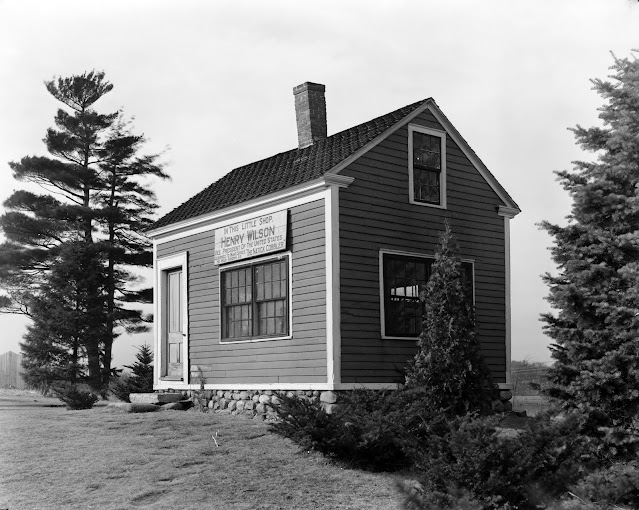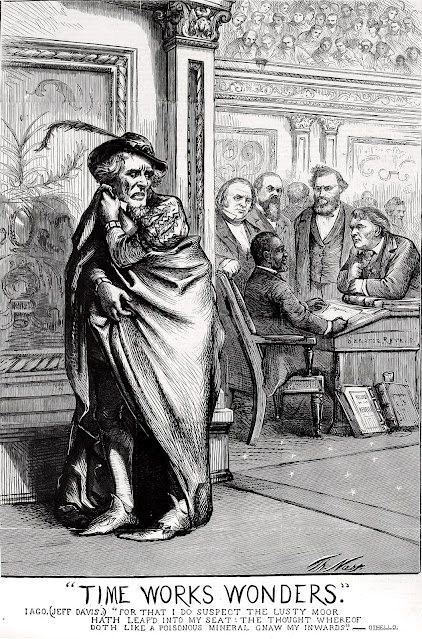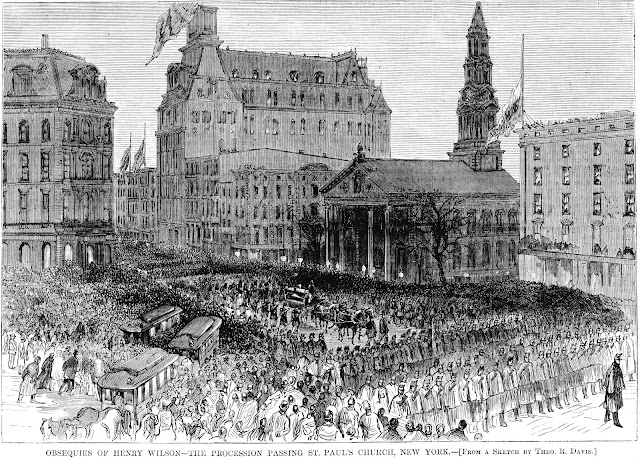This 1859 photo of Henry Wilson, Senator from Massachusetts, Thirty-fifth Congress by Julian Vannerson belongs to Brady Handy Collection at the Library of Congress.
Funk and Wagnalls give us this short bio of Wilson.
Wilson, Henry (1812–75), 18th vice-president (1873–75) of the U.S. A native of New Hampshire, Wilson served as an indentured farm laborer in his youth. Subsequently he learned shoemaking and in the late 1830s acquired ownership of a shoe factory in Natick, Mass. In 1840 he was elected to the Massachusetts legislature and became a U.S. senator from Massachusetts in 1855. Having been a member of the Whig, Free-Soil, and Know-Nothing parties, he joined the newly formed Republicans in 1855. As chairman of the Senate Committee on Military Affairs during the American Civil War, Wilson played an important role in recruiting, equipping, and training Union forces. He served as vice-president under Ulysses S. Grant.
Henry Wilson was born in Farmington, New Hampshire. Two historical markers mark the spot.
Photo by Cosmos Mariner,
HMdb.
Born in Farmington February 16, 1812, Jeremiah Jones Colbath, this self-educated farm boy changed his name when of age to Henry Wilson. He became a teacher, member of Congress, United States Senator and took office as Vice President under President Ulysses S. Grant March 4, 1873. He suffered a stroke and died in the Vice President’s chambers in the Capitol, November 22, 1875.
Photo by Cosmos Mariner,
HMdb.
Henry Wilson
Vice President
U.S.A.
Born Here
Feb. 16, 1812
Springing from his humble origin as a shoe-maker in Natick Mass., Wilson came to be called “The Natick Cobbler” or the “Natick Shoemaker” and so he was called when he ran for vice-president in 1872.
U.S. Grant, “The Galena Tanner”, running for his second term, headed the Republican ticket. This “Working-Man's Banner” poster emphasized the working-class origins of the Republican candidates.
Published by Currier & Ives, 1872
Henry Wilson's Shoe Shop survives and is on the National Regiser of Historic Places. This picture by Arthur C. Haskell is from 1937. (
LOC)
Henry Wilson Shoe Shop, West Central & Mill Streets, Natick, Middlesex County, MA,
Arthur C. Haskell, Photographer
The sign reads:
In This Little Shop
Henry Wilson
Vice President of the United States
Learned to Make Shoes
He was known as
“The Natick Cobbler”
During the Civil War, Senator Wilson was chairman of the Committee on Military Affairs. In 1861 he raised a brigade of Massachusetts Militia, The 22nd Massachusetts Infantry Regiment. He held, thereby, the rank of Brigadier General in the Massachusetts Militia and Colonel in the U.S. Army. This engraving of “Col. Henry Wilson of Mass.” by John Chester Buttre after Mathew B. Brady shows him in uniform.
Col. Henry Wilson of Mass.
Wilson famously carried a picnic basket when he went out in his carriage to witness the Battle of Bull Run. He was caught up in the subsequent chaos of the rout and had to walk back to Washington. A rumor blamed Wilson for the loss, accusing him of revealing military plans to Confederate spy, Rose O'Neil Greenhow.
In December of 1861, Henry Wilson introduced the bill that abolished slavery in the District of Columbia, which after overcoming severe opposition, President Lincoln signed into law on March 3, 1863. Will P. Kennedy in his column in The
Washington Star, July 15, 1945, tells how this fulfilled a long-time goal for Wilson.
Wilson's Abolition Act fulfilled a pledge made 26 years before when he first came to Washington. He boarded for a month on Capitol Hill and visited William's notorious slave pen at Seventh and B streets. “I saw slavery beneath the shadow of the flag that waved over the Capitol,” he said, “I saw the slave pens. I left the Capital of my country with the unalterable resolution to give all that I had to the cause of emancipation in America.” From Washington he returned to Dartmouth College and at the close of the school year spoke on the affirmative side of the question: “Ought slavery to be abolished in the District of Columbia?” -- Will P. Kennedy
Under the act slave-owners who took an oath of loyalty to the Union, were compensated for the loss of their property. As Kennedy explains, “A veteran slave dealer from Baltimore handled the business in one of the courtrooms {of the DC Courthouse}. The highest appraisal was $785 for a good blacksmith and the lowest $10.95 for a baby.”
Henry Wilson
An anti-slavery agitator and Vice-President in 1872. While in Congress in 1862 he introduced a bill for the employment of Negroes as Soldiers.
In 1870 Wilson strongly defended the election of Hiram Revels to the Senate. Here's Senator Wilson (on the left), in 1870 with Hiram Revels, in the background of a Thomas Nast cartoon featuring Jefferson Davis as Iago lamenting that his Mississippi Senate seat was now occupied by an African American.
“Time Works Wonders”
Iago (Jeff Davis) “For that I do suspect the lusty moor
hath leap'd into my seat; the thought whereof
doth like a poisonous mineral gnaw at my inwards.” -- Othello
Wilson died of a stroke in the Capitol on November 10, 1875, in the Vice President's room, where this bust of Henry Wilson by Daniel Chester French can be found. It was modeled in 1855 but carved in 1885. (See
The Vice President's Room, U. S. Senate)
Henry Wilson by Daniel Chester French
We can see Wilson's bust in the Vice President's room in this ca. 1900 photo by Francis Benjamin Johnson.
Harper's Weekly published this engraving, from a sketch by Robert Lewis, of Henry Wilson's remains lying in state at Doric Hall, Boston. (
Harper's Weekly, December 18, 1875, page 1020.)
Obsequies of Henry Wilson - The Remains Lying in State in Doric Hall, Boston, Massachusetts
And here's an engraving of a sketch by Theodore R. Davis of Wilson's funeral procession in New York.
Obsequies of Henry Wilson - The Procession Passing St. Paul's Church, New York.
Wilson was buried in Dell Park Cemetery in Natick.
The Grave at Dell Park Cemetery
from a sketch by Theo. R. Davis
The Grave of Henry Wilson and Family, Dell Park Cemetery, Natick
The stone on the far left of the picture is that of Henry Wilson's son
(LTC) Henry Hamilton Wilson who died in Austen, Texas, during the Civil War. The epitaph on the side we can't see says:
He the young and strong, who cherished
Noble longings for the strife,
By the roadside fell and perished,
Weary with the march of life.
Department of the South. Department of the Gulf.
Harriet M. Howe, born in Natick, Nov. 21, 1824;
married to Henry Wilson Nov. 28, 1810;
died May 28, 1870.
She made home happy.
But oh for the touch of a vanquished hand.
And the sound of a voice that is still
As Nanson and Russell put it, “At a little distance, in the same lot, stands the twin headstone of his father and mother. It is of beautiful design ; and on it is inscribed:
Winthrop Colbath, born April 7, 1787; died Feb. 10, 1860; and
Abigail Colbath, born March 21, 1785; died Aug. 8, 1866.”
The cross headstone shown above has given way to a sarcophagus.
Henry Newcum took this photo of Wilson's grave in 2014, (
Wikipedia - re-cropped by ACB)

A nearby plaque recapitulates Wilson's story. (Photo by Family Historian, at
Find-a-Grave, re-cropped by ACB)
Henry Wilson
1812 - 1875
Shoemaker, Ardent Statesman & Abolitionist
Known in Congress as “The Natick Cobbler”
Founder & First Colonel fo 22nd Regiment,
Massachusetts Volunteer Infantry 1861
U.S. Senator from Massachusetts 1855-1873
U.S. Vice President 1873-75
Placed by Dell Park Cemetery Association and
22nd Massachusetts Volunteer Infantry, Inc.
October 2, 2011
In 1878, veterans of the Union army erected a monument to the memory of Henry Wilson at the Rose Chapel on the grounds of the Soldier's Home in Washington, DC.
Harper's Weekly published this engraving by WPS from a photo by Rick Brothers, Washington DC. in November of 1878.
The Monument to Henry Wilson
Harper's went on to describe the inscriptions.
On the front face, in large raised letters, is the inscription: “Henry Wilson, the Soldiers' Friend;” on the opposite face: “Erected by the Enlisted Men of the Army;” and on the end: “Died, Vice-President of the United States, November 22, 1875.”
In 1872 a veteran named Fred Eberle, in The Indianapolis Journal, gave an example of why Henry Wilson had the sobriquet “The Soldiers' Friend;” (or is it “The Soldier's Friend?”).
Hon. Henry Wilson
























No comments:
Post a Comment